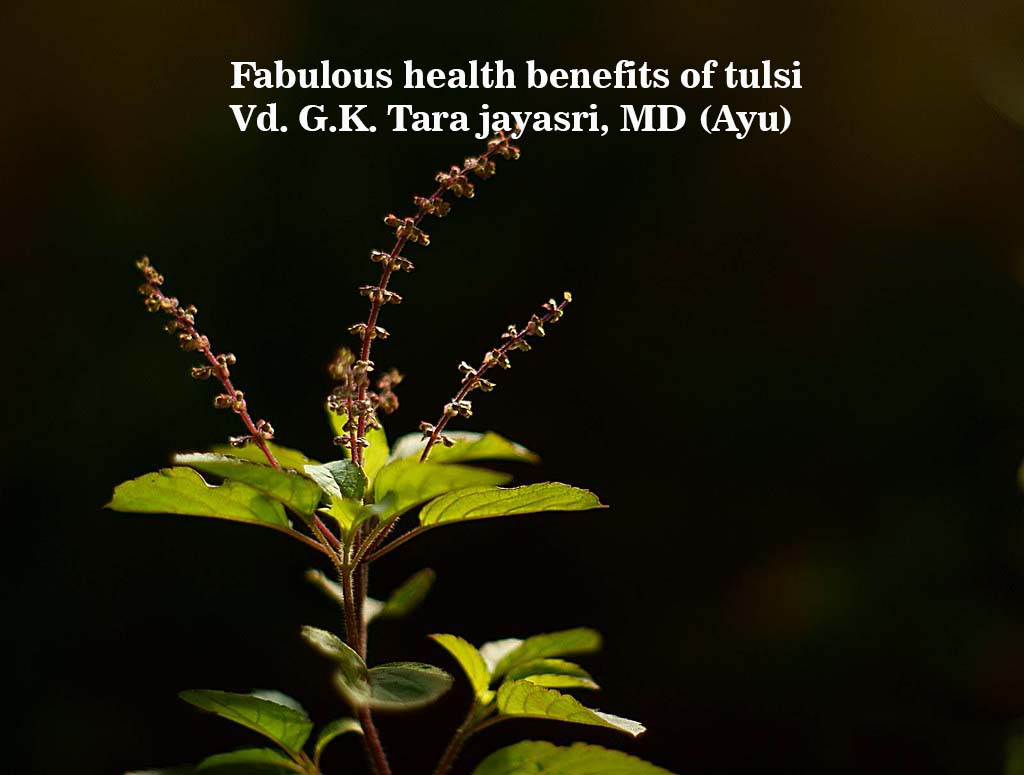Fabulous Health Benefits of Tulsi

Within Ayurveda, tulsi is known as “The Incomparable One,” “Mother Medicine of Nature” and “The Queen of Herbs,” and is revered as an “elixir of
life” that is without equal for both its medicinal and spiritual properties.
Characteristics of the Tulsi Plant
A member of the basil family (Lamiaceae), its leaves can be green or purple, depending on the variety. Tulsi has a pungent rasa (taste), a heating
veerya (energetic effect), and a pungent vipaka (post-digestive effect). Balancing for vata and kapha doshas, it may increase pittha in excess.
Not just one, there are three different types of tulsi. According to Ayurvedic texts, the three different types of tulsi are: rama
(green leaf) tulsi, shyama (purple leaf) tulsi, and vana (wild leaf) tulsi. Although all three types of tulsi have their uses in Ayurveda, green leaved rama-tulsi is the most widely used.
Tulsi has many benefits for the body, mind, and spirit, offering support on both physical and subtle levels. Some of the benefits of tulsi include:
- The herb stimulates neurotransmitters that regulate the hormones responsible for including happiness and energy. Chewing 10-12 fresh Tulsi leaves control stress and manage anxiety.
- Tulsi is renowned for its support of the lungs, removing kapha buildup, and promoting healthy, uncongested breathing.
- Tulsi helps promote healthy weight management thanks to its effect in the
adipose tissue layer - Balancing Vata and Kapha Doshas: In addition to its ability to balance kapha in the lungs, it also balances excess kapha and vata in the head and
nerves, and is often used to soothe vata in the digestive tract - Skin Care:
- Properties of Tulsi help prevent the formation of acne.
- Juice of Tulsi leaves is used in treating ringworm and skin disorders.
- This beneficial herb as skin ointments for treating leucoderma.
- It also prevents premature ageing and keeps the skin healthy.
- Vitamin C and A, phytonutrients, in Holy Basil are great antioxidants and protect the skin from almost all the damages caused by free radicals.It can
also reduce the itchiness of the scalp as well as control hair fall. - Extracts made from its leaves are thought to boost wound healing speed and strength.
- Tulsi plant is known to enhance livers health which is why it aids in improving the digestion system.
- The decoction of tulsi leaves, neem leaves, powder of ginger and powder of long pepper has the ability to reduce fever and its symptoms
considerably. - Tulsi leaves show a positive impact in reducing cholesterol level in the body, thereby helpful in preventing cardiac diseases. Eugenol also proves
useful in reducing cholesterol levels in the blood. Vitamin K is an essential fat-soluble vitamin that plays an important role in bone health and heart health. - Tulsi acts a mild diuretic and detoxifying agent which helps in lowering the uric acid levels in the body. Acetic acid present in holy basil helps in the
breakdown of the stones. - Tulsi is a natural headache reliever which can also relieve migraine pain. A decoction of tulsi leaves makes a good medicine for headache. Pounded leaves mixed with sandalwood paste can be applied on the forehead for relief.
- Holy basil destroys the bacteria that are responsible for dental cavities, plaque, tartar, and bad breath, while also protecting the teeth.
- Tulsi tea can be effective in managing type 2 Diabetes. It’s one of the most preferred herbal teas for managing Diabetes.
- Tulsi contains zinc and vitamin C, two components that help fight infections. Daily intake of Tulsi leaves helps to boost immunity.
Side effects of tulsi Leaves:
- Affects male and female fertility: In a study conducted on animals, it was discovered that tulsi could lower sperm motility and count in animals when consumed in large quantities. It is wise for males with infertility issues to prevent this negative effect by lowering the consumption of the herb
- Lowers blood sugar: Tulsi is known to reduce blood sugar levels. However, if a person is currently taking Diabetes medication, consuming tulsi leaves could increase the effect and cause the sugar level to drop too low.
- Harmful to those patients on blood-thinners: Blood thinning is a known side effect of the tulsi plant. People who use anti-clotting medicine should avoid basil leaf consumption.
- Pregnancy: Tulsi leaves can have an impact on the health of a pregnant woman and her unborn child. In extreme circumstances, it may even result in miscarriage. The herb may lead to potentially harmful uterine contractions.
- Damages tooth enamel: Tulsi leaves shouldn’t be chewed since they contain mercury, which harms the enamel.Tulsi contains mercury, which when chewed, releases in the mouth and damages and discolours the teeth. Additionally, tulsi leaves are acidic by nature, but the mouth is alkaline, which can hasten the deterioration of the tooth enamel. To prevent tooth discolouration, one should just swallow them down.
